Integrating into your local community
Once you arrive in your host country and begin to settle in, you can start to look for ways to integrate into your local community. Though it may seem a little daunting at first, it’s an important part of the experience. Becoming involved in your community will help you overcome culture shock, develop new friendships as well as improve your effectiveness as a volunteer. This doesn’t mean that you shouldn’t also be friends with other volunteers (if there are any), which may give you a sense of comfort and solidarity, but you should also consider stretching yourself outside of your comfort zone as the rewards can be immense.
If you’ve just arrived and are looking for ways to engage, try out some of the following strategies. Your co-workers can also potentially provide suggestions for activities. If you are living in a capital city, it might be worthwhile to contact your local embassy; some host regular activities, which can be a good way to meet expats or learn more about your host city.
Community Integration 101
Be curious: ask questions, listen openly and challenge your own assumptions. Demonstrate a genuine interest in local news, events and community activities and participate when and where appropriate. If you’re not sure, ask a trusted local.
Be culturally appropriate: research, observe and speak to locals about how to best act and communicate in your host culture. Be aware of your non-verbal communication: it may make more of an impact than you think! Observe local cultural and spiritual practices where appropriate, always asking permission before participating in local activities or visiting certain holy sites.
Be respectful and gracious: treat everyone you meet with respect and do your best to find ways to be helpful and friendly to those around you.
Learn the language: this might be the most important way for you to build relationships with those around, you and it will also improve the effectiveness of your volunteer activities. Take any and every opportunity (see below) to practice and don’t worry about making mistakes!
Live like a local: consider living at the level of local staff. Experiment with local cuisine to find your favorites and take any opportunity you can to practice your language skills. Living in a homestay and/or joining a sports team or other clubs are all great ways to meet lots of new people and start to feel more at home.
Challenges you may encounter
Living and working in a new place and culture always comes with certain challenges, some of which you may expect and others that can take you by surprise. It’s a good idea to prepare yourself mentally, although it is impossible to predict how you will feel in a given situation until you actually experience it. Below are some issues you may encounter, though these will vary greatly across countries, cultures and religions. Do your research so you know what to expect and talk to other volunteers, foreigners or trusted colleagues and friends to get general advice or suggestions for a specific situation.
You might be stared at, touched without permission or asked questions you deem inappropriate.
You may blend in less easily in your host country than at home and it can be difficult to feel anonymous. For some volunteers, this might be the first time they experience being a minority. Locals, especially children, may stare at you, want to touch your hair or skin or ask you questions about your marital status, bank account or other intimate personal details. People are generally not trying to be rude, they may just be unaccustomed to seeing someone who looks like you and be genuinely curious or surprised. Test out some strategies for dealing with these situations and determine what works for you. Some women choose to wear a fake wedding ring if they are single to avoid some of these conversations.
You might have new constraints placed on your freedom.
You may be able to express yourself less freely than you are accustomed to at home. Security concerns might require you to always go out with someone or to avoid walking after dark. Overindulgence in alcohol, drugs and sex is probably not a good idea and in some locations it may be advisable to keep your sexual orientation to yourself. There may also gender dynamics in some countries that could affect your daily activities. These limits may be frustrating but are often important for your safety, so you need to be prepared to adjust your behavior accordingly.
You might be surprised by how long it takes to accomplish certain tasks.
Running common errands such as going to the bank or the post office can sometimes take much longer (and be more chaotic experiences) than you might be accustomed to. In certain cultures, punctuality and timelines can also be more fluid and you may need to learn how to slow down and go with the flow in your new workplace.
You might experience communication challenges.
Learning how to communicate effectively in a new culture is not easy and you might make a number of mistakes along the way, which is okay. Do your best to listen and observe as much as you can and make sure you are always respectful and kind in your communication. When misunderstandings occur (and they will!) try to clear them up as soon as possible. Being able to laugh at yourself will go a long way towards getting through the initial challenges.
Another common issue you may encounter is people saying yes to things even though they will not be able to deliver. The way this manifests is dependent on the culture (in some cultures this is a standard aspect of their communication), but it’s a good idea to know it can happen. Try to sense hesitation on the part of your colleagues, friends or homestay family, and probe more deeply if you think the answer to your question might actually be a maybe or no.
You might have others make assumptions and unreasonable requests of you.
In some places, you might have to deal with a range of assumptions that people have about you because of where you come from or the color of your skin. This can happen anywhere, but your experience may be more pronounced while you are abroad. One of the most common assumptions revolves around the idea that all foreign volunteers are wealthy. Volunteers may find this frustrating since they are giving their time (and often paying out of pocket) to do good work for the benefit of a community. Being asked for money on a frequent basis can sometimes feel like an insult, especially if you spent your savings to volunteer. One thing that can exacerbate this situation is giving gifts to community members. Not only can it lead to larger requests, but it may also set a precedent that future volunteers have to deal with. Check out our gift giving guidelines for some tips on what, when and how it might be appropriate to deal with the gift situation while you are volunteering abroad.



